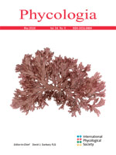
PHYCOLOGIA
Scope & Guideline
Advancing Knowledge in Aquatic and Plant Ecosystems
Introduction
Aims and Scopes
- Algal Taxonomy and Systematics:
The journal emphasizes the classification, naming, and evolutionary relationships among algal species, including descriptions of new species and genera across various algal groups. - Ecophysiology and Adaptation:
Research focusing on the physiological responses of algae to environmental changes, including temperature, salinity, and light conditions, is a central theme, highlighting the adaptive mechanisms of different algal species. - Biodiversity and Biogeography:
Phycolgia publishes studies that explore the diversity and distribution of algal taxa in various ecosystems, contributing to the understanding of biogeographic patterns and ecological roles of algae. - Biotechnological Applications:
The journal also covers the application of algal research in biotechnology, including algal biofuels, phycoremediation, and the use of algae in food and cosmetic industries. - Harmful Algal Blooms (HABs):
Research on the dynamics, impacts, and management of harmful algal blooms is a significant focus area, addressing ecological and public health concerns.
Trending and Emerging
- Molecular Phylogenetics and Genomics:
There is an increasing trend in studies utilizing molecular techniques and genomic approaches to resolve phylogenetic relationships and species identification in algae, reflecting advancements in technology and methodology. - Climate Change Impact Studies:
Research examining the effects of climate change on algal physiology, distribution, and ecosystem dynamics is on the rise, highlighting the urgent need to understand algal responses to global environmental changes. - Ecological Interactions and Microbiomes:
Emerging research focuses on the interactions between algae and their associated microbiomes, exploring how these relationships influence algal health, resilience, and ecosystem functioning. - Biotechnological Innovations:
There is a notable increase in studies exploring innovative uses of algae in various industries, including food, pharmaceuticals, and environmental remediation, reflecting the growing interest in sustainable practices. - Harmful Algal Blooms and Toxin Studies:
Research on harmful algal blooms, their dynamics, and associated toxins is gaining momentum, driven by public health concerns and the need for effective management strategies.
Declining or Waning
- Marine Algal Ecology Studies:
There has been a noticeable decline in studies focusing on general ecological assessments of marine algal communities, possibly due to a shift towards more specialized and molecular approaches. - Traditional Morphological Studies:
The journal is seeing fewer papers dedicated solely to traditional morphological studies of algae, as there is a growing preference for molecular and genetic analyses that provide deeper insights into algal diversity. - Freshwater Algal Research:
Research pertaining to freshwater algae is becoming less prevalent, with more emphasis shifting towards marine algae and their applications in coastal ecosystems.
Similar Journals

Mediterranean Botany
Bridging Science and Sustainability in Mediterranean BotanyMediterranean Botany is a distinguished peer-reviewed journal dedicated to the flourishing fields of Ecology, Plant Science, and Ecology, Evolution, Behavior and Systematics. Published by the Universidad Complutense de Madrid, Servicio Publicaciones, this Open Access journal has been disseminating valuable research since 2018, ensuring that findings are accessible to a global audience, with an emphasis on Mediterranean vegetation and biodiversity. With an ISSN of 2603-9109, it contributes significantly to the academic discourse in its category quartiles, recently featuring in Q3 for Ecology and related fields. Notably, Mediterranean Botany ranks within the top half of its category in Scopus, highlighting its relevance and contribution to the scientific community. Researchers, professionals, and students alike will find the journal to be a vital resource for latest discoveries, trends, and conservation strategies in Mediterranean ecosystems, positioning it as an essential platform for advancing knowledge and fostering collaboration within the plant sciences.
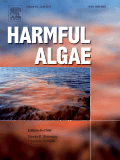
HARMFUL ALGAE
Advancing knowledge on aquatic threats.HARMFUL ALGAE is a prestigious journal dedicated to the study of harmful algal blooms and their impact on aquatic ecosystems, human health, and the environment. Published by Elsevier in the Netherlands, this journal has established itself as a leader in the field, reflected by its Q1 ranking in both Aquatic Science and Plant Science for 2023. With an impressive Scopus ranking placing it #6 out of 247 in Aquatic Science and #20 out of 516 in Plant Science, it occupies a critical place within the scientific community, attracting a high percentile of scholarly attention. Catering to a global audience of researchers, professionals, and students, HARMFUL ALGAE provides a platform for original research, comprehensive reviews, and critical insights that further our understanding of this vital area of study. As it converges from 2002 to 2024, the journal continues to be an essential resource for advancing knowledge and innovation in the management and study of harmful algal phenomena.
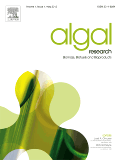
Algal Research-Biomass Biofuels and Bioproducts
Pioneering research for a greener bioeconomy.Algal Research - Biomass Biofuels and Bioproducts is a prestigious academic journal published by Elsevier, dedicated to advancing the field of algal biotechnology and its applications in biomass, biofuels, and bioproducts. With an ISSN of 2211-9264 and a notable impact factor, this journal is recognized as a leading source of innovative research, boasting a current Scopus rank of #31 out of 406 in the domain of Agricultural and Biological Sciences, specifically Agronomy and Crop Science, positioning it in the top 8% of its field (92nd percentile). This open-access publication, established in 2012 and covering literature up to 2024, prioritizes disseminating high-quality research that fosters sustainable solutions for energy and bioproducts derived from algal resources. As a Q1 ranked journal in the 2023 Agronomy and Crop Science category, it serves as a vital resource for researchers, professionals, and students seeking to understand and leverage the potential of algae within the biodiverse framework of bioeconomy and sustainable practices.

Botany
Fostering global knowledge in plant sciences.Botany is a premier academic journal published by Canadian Science Publishing, dedicated to advancing the understanding of plant sciences and ecological systems. With an ISSN of 1916-2790 and an E-ISSN of 1916-2804, this journal has established itself as a respected publication in the fields of Ecology, Evolution, Behavior and Systematics, and Plant Science, reflected in its 2023 Q2 and Q3 rankings. Covering a wide range of topics, Botany is committed to fostering interdisciplinary research, promoting innovative methodologies, and disseminating significant findings from both theoretical and applied perspectives. Based in Ottawa, Canada, the journal is open access, ensuring that high-quality research is accessible to a global audience, thereby playing a crucial role in the dissemination of knowledge in the scientific community. With convergence years from 2008 to 2024, it continues to evolve alongside the scientific advancements in botanical studies, making it an essential resource for researchers, professionals, and students alike.

CONTRIBUTIONS TO ZOOLOGY
Championing Innovative Research in ZoologyCONTRIBUTIONS TO ZOOLOGY, published by BRILL, is a premier scholarly journal dedicated to advancing the field of zoological sciences. With an ISSN of 1383-4517 and an E-ISSN of 1875-9866, this journal serves as a vital platform for researchers, professionals, and students seeking to share their findings and insights related to animal science, ecology, evolution, and systematics. Recognized for its high academic standards, it ranks in the top quartile (Q1) for Animal Science and Zoology, and Q2 for Ecology, Evolution, Behavior, and Systematics, reflecting its significance and influence in the scholarly community. The journal has been consistently published since 1994 and continues to contribute pivotal knowledge that informs and shapes contemporary zoological research. Researchers can access the journal through traditional subscription models, ensuring broad dissemination of its impactful articles and studies. Contributions to Zoology plays an essential role in fostering collaboration and discussion within the zoological community in the Netherlands and beyond.
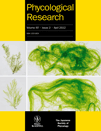
PHYCOLOGICAL RESEARCH
Exploring the vital role of algae in our world.PHYCOLOGICAL RESEARCH is a leading journal in the field of aquatic and plant sciences, published by Wiley, recognized for its commitment to advancing knowledge in the study of algae and their ecological significance. With a diverse scope encompassing ecological interactions, evolutionary behaviors, and physiological processes, PHYCOLOGICAL RESEARCH aims to provide a platform for researchers to disseminate innovative findings and insights pertinent to both agricultural and biological sciences. The journal's impressive rankings—placing it in the 74th percentile within Agricultural and Biological Sciences (miscellaneous) and holding a Q2 category in key fields—underscore its impact and importance in academia. Despite not being open access, the journal ensures broad distribution and visibility through its dedicated readership. Since its inception in 1995, PHYCOLOGICAL RESEARCH has continuously evolved, shaping and influencing the direction of research in phycology and related disciplines, making it an essential resource for students, professionals, and researchers alike.

BRITTONIA
Connecting Researchers Through Plant Science InsightsBRITTONIA, published by Springer, stands as a reputable journal dedicated to advancing the fields of botany and plant sciences. With a storied history dating back to 1931, this journal has evolved to embrace contemporary research spanning various aspects of plant biology, ecology, and systematics. Focusing on a comprehensive analysis of both ecological interactions and plant systematics, BRITTONIA plays a crucial role in disseminating knowledge among researchers and professionals committed to understanding plant life and its environmental contexts. Despite its open access status being currently unavailable, the journal ensures wide accessibility through institutional subscriptions. In the latest rankings, it proudly holds a Q2 category in Plant Science and a Q3 category in Ecology, Evolution, Behavior, and Systematics, indicating its growing influence and academic rigor. Researchers and students alike will find BRITTONIA an essential resource for the latest findings and discussions in plant sciences.
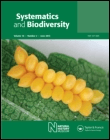
SYSTEMATICS AND BIODIVERSITY
Fostering innovative methodologies in systematics and biodiversity.Systematics and Biodiversity, published by Taylor & Francis Ltd, is a prominent academic journal that provides a vital platform for advancing research in the fields of ecology, evolution, and plant science. With an ISSN of 1477-2000 and an E-ISSN of 1478-0933, the journal has established itself as a reputable source of scholarly information since its inception in 2003, and continues to publish cutting-edge studies through 2024. Recognized for its rigorous peer-review process, it holds a prestigious position in academic circles, reflected by its Q2 ranking in Ecology, Evolution, Behavior and Systematics and Q1 ranking in Plant Science as of 2023. The journal's contributions are further characterized by its strong performance in Scopus rankings, placing it in the 69th and 68th percentiles in its respective categories. Researchers, professionals, and students alike will find invaluable insights and innovative methodologies within its pages, making Systematics and Biodiversity an essential resource for those dedicated to understanding the complexities of biological diversity and systematics. The journal's impact factors and commitment to high-quality research underscore its significance in shaping the future of ecological and botanical studies.

Fottea
Exploring the depths of algal biology and ecology.Fottea is a prestigious journal, published by the Czech Phycological Society, dedicated to advancing the field of plant sciences with a specific focus on freshwater algal research. Established in 2008, this quarterly publication has steadily gained recognition, evidenced by its impressive Q2 ranking in Plant Science and a solid placement within the 68th percentile among its peers in Scopus rankings. Fottea serves as a vital platform for researchers, professionals, and students to disseminate and access cutting-edge studies, fostering collaboration and innovation within the aquatic ecosystem research community. Although currently operating under a traditional publishing model without open access options, it remains committed to providing high-quality, peer-reviewed content that is essential for the progression of phycology and related disciplines. With its base in the beautiful Czech Republic, the journal aims to bridge local and global research efforts, contributing to the broader understanding of algal biology and ecology.
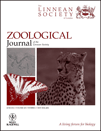
ZOOLOGICAL JOURNAL OF THE LINNEAN SOCIETY
Connecting past discoveries with future innovations in ecology.Zoological Journal of the Linnean Society, published by Oxford University Press, stands as a prestigious vessel for scholarly discourse in the fields of Animal Science and Ecology. With an ISSN of 0024-4082 and E-ISSN 1096-3642, this journal has an illustrious history dating back to its inception in 1866, and has consistently contributed groundbreaking research that shapes our understanding of zoology and evolutionary biology. Operating out of the United Kingdom, the journal boasts an impressive Q1 ranking in both Animal Science and Zoology and Ecology, Evolution, Behavior and Systematics, positioning it among the top tier of its category. With a significant presence in the academic landscape, the journal ranks 24th among 490 in Animal Science and 97th among 721 in Ecology, reflecting its impact and relevance in the field. Although it is not an open access journal, the wealth of knowledge it offers is invaluable for researchers, professionals, and students alike, aiding in the advancement of zoological sciences.